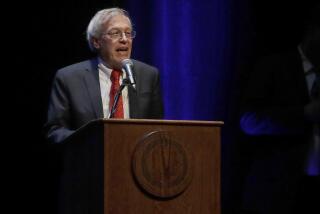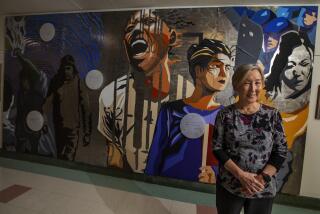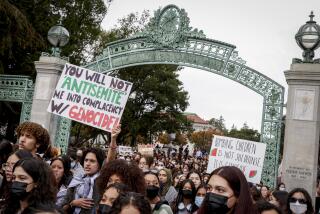Op-Ed: John Boalt’s primary legacy is a racist anti-Chinese essay. Strip his name from UC Berkeley Law already

The law school at UC Berkeley, after a yearlong review, has formally asked the chancellor to take the name “Boalt” off its building. The question remains, though, why John Henry Boalt’s name was ever affixed to University of California property in the first place.
A lawyer in late 19th century Oakland, Boalt’s primary legacy was a virulently racist essay that launched the campaign for the Chinese Exclusion Act of 1882, which banned immigration of Chinese laborers to the U.S. for more than 60 years. In “The Chinese Question,” Boalt allowed that the Chinese might be smarter than some native tribes and preferable to the “African Negro,” but “the Chinaman has brought to us and planted within our border all the vicious practices and evil tendencies of his home … .” He wrote that the “Caucasian and Mongolian” races were “separated by a remarkable divergence in intellectual character and disposition.” In Boalt’s view, the Chinese could not assimilate and the races should not associate with one another.
By contrast, UC Berkeley — and its law school in particular — were ahead of the curve on welcoming diversity. “From its inception, Berkeley Law, unlike many law schools of the period, was open to all qualified applicants, regardless of their gender, religion, or ethnicity,” brags the law school’s website.
The trustees built a hall of law and named it in honor of this renowned bigot. Why?
I know it’s true. The university’s policies and practices helped students skirt the Chinese Exclusion Act that Boalt championed. My grandfather was one of them.
In 1903 (the year of the law school’s first graduating class, which included a Japanese citizen), my grandfather Liu Ch’engyu arrived in San Francisco from Shanghai. He’d been sent by Sun Yatsen, now known as the Father of Modern China, who was then fomenting a revolution against China’s centuries-old imperial government. My grandfather’s assignment was to edit a pro-democracy daily in Chinatown and generate support for the rebellion back home.
But the only way for him to get around the Chinese Exclusion Act was a student visa. A scholarship to UC Berkeley secured his entry into the U.S. Then he needed an English tutor, which was how he met my grandmother. This Kansas-born daughter of pioneers was living alone in San Francisco, teaching English to foreign students to support herself.
According to Boalt, my grandparents should have repelled each other. Americans, he wrote, viewed the Chinese with “an unconquerable repulsion which … must ever prevent any intimate association or miscegenation of the races.” Anti-miscegenation was a cornerstone of his insistence that the Chinese should either be enslaved or “exterminated.” Since the recent Civil War had diminished the nation’s appetite for slaughter and led to the prohibition of slavery, exclusion became Boalt’s last resort.
My grandparents never got the memo. My grandfather was no heathen criminal or cruel misogynist. He was a poet and a scholar, son of a Chinese viceroy — a political idealist who championed democracy. And when the great San Francisco earthquake and fire of 1906 left my grandmother homeless and penniless, my grandfather was the one person in that devastated city who protected her.
When my grandparents decided to marry, they had to travel across four states before they found a justice of the peace who would join them, most western “justices” being of Boalt’s mind-set. But once wed they returned to San Francisco and embarked on a marriage that would last the next 30 years and produce four children. So, I owe my existence, in part, to UC Berkeley’s openness to Chinese students.
Coincidentally, the same disaster that brought my grandparents closer together nearly spared the university from its association with Boalt. Just six weeks earlier, his widow had donated two properties in San Francisco to pay for the law building, but both burned in the great fire. Only one was salable, and the proceeds came nowhere near covering the construction costs.
The UC trustees at the time surely knew that the brand of lawmaking Boalt had championed contravened the university’s inclusive policies. He’d had no personal relationship with the university, never taught or studied there. Nor had he made any financial or scholarly contributions.
Enter the Fray: First takes on the news of the minute from L.A. Times Opinion »
Nevertheless, the trustees built a hall of law and named it in honor of this renowned bigot. Why? Because, when the trustees invited Elizabeth Boalt to preside over the 1912 dedication of the law building, they were securing a primary position in her will. By the time Mrs. Boalt died five years later, she’d also endowed the “John H. Boalt” professorship and one in her own name.
A charitable term for the sacrifice of values in exchange for funding is “compromise.” A less charitable term might be “hypocrisy.” Either way, the Boalt name will never square with the law school’s inclusive traditions.
And yet, this disgraceful saga still isn’t over. Because of the terms of the bequest, de-naming the Boalt professorships would require approval of the state attorney general, and to date no one officially has requested such a change. As for Boalt Hall, the campus Building Name Review Committee must now complete its own review before UC Chancellor Carol Christ and President Janet Napolitano will weigh in. The process could go on for months.
According to Charles Cannon, who chaired the law school’s review committee, “We are not talking about stripping the Boalt name out of existence but rather putting it in the proper historical context.” What possible “historical context” could justify even another day’s delay?
Aimee Liu teaches in the graduate creative writing program at Goddard College. Her novel “Cloud Mountain” is based on her grandparents’ cross-cultural marriage.
Follow the Opinion section on Twitter @latimesopinionand Facebook
More to Read
A cure for the common opinion
Get thought-provoking perspectives with our weekly newsletter.
You may occasionally receive promotional content from the Los Angeles Times.






